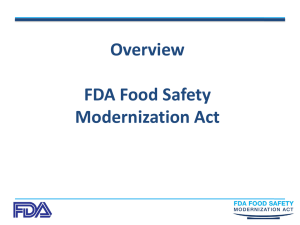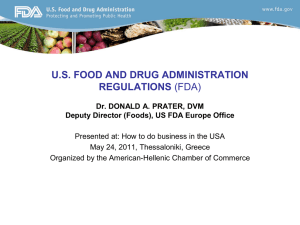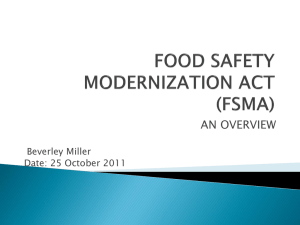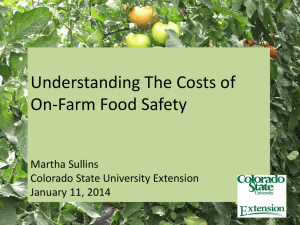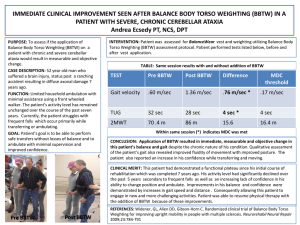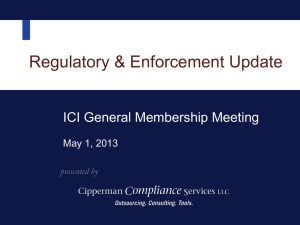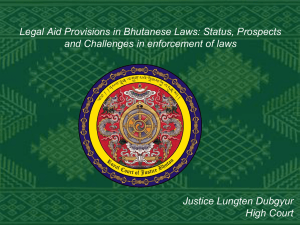Focus on Imports - FDA Food Safety Modernization Act
advertisement
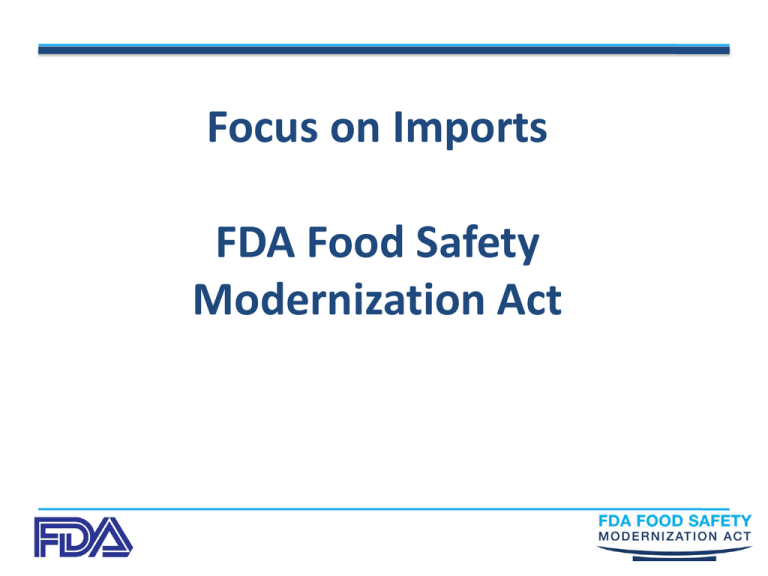
Focus on Imports FDA Food Safety Modernization Act Food Safety Modernization Act “I thank the President and members of Congress for recognizing that the burden that foodborne illness places on the American people is too great, and for taking this action.” Margaret A. Hamburg, M.D., Commissioner of Food and Drugs Agenda • • • • The public health imperative Why is the law needed? Provisions of the law; focus on imports Implementation The Public Health Imperative • Foodborne illness is a significant burden – About 48 million (1 in 6 Americans) get sick each year – 128,000 are hospitalized – 3,000 die • Immune-compromised individuals more susceptible – Infants and children, pregnant women, older individuals, those on chemotherapy • Foodborne illness is not just a stomach ache—it can cause life-long chronic disease – Arthritis, kidney failure Why is the law needed? • Globalization – 15 percent of U.S. food supply is imported • Food supply more high-tech and complex – More foods in the marketplace – New hazards in foods not previously seen • Shifting demographics – Growing population (about 30%) of individuals are especially “at risk” for foodborne illness Main Themes of the Legislation Prevention Inspections, Compliance, and Response Enhanced Partnerships Import Safety Import Safety: Most Groundbreaking Shift • Current reliance on port-of-entry inspection cannot handle increase in imported food. • Importers now responsible for ensuring that their foreign suppliers have adequate preventive controls in place • Requires food from abroad to be as safe as domestic Import Safety Mandates Sec. 301. Foreign supplier verification program • Requires importers to verify their suppliers use risk-based preventive controls that provide same level of protection as U.S. requirements. Sec. 302. Voluntary qualified importer program • Allows for expedited review and entry; facility certification required Sec. 303. Certification for high-risk food imports • FDA has discretionary authority to require assurances of compliance for high-risk foods Import Safety Mandates Sec. 304. Prior notice of imported food shipments • Requires information on prior refusals to be added to prior notice submission Sec. 305. Capacity building • FDA mandate to work with foreign governments to build food safety capacity Sec. 306. Inspection of foreign food facilities • Can deny entry if FDA access for inspection is denied Sec. 201. Targeting of inspection resources • Increased inspection of foreign as well as domestic facilities Import Safety Mandates Sec. 307. Accreditation of third-party auditors • FDA can rely on accredited third parties to certify that foreign food facilities meet U.S. requirements Sec. 308. Foreign Offices of the Food and Drug Administration. • Establish offices in foreign countries to provide assistance on food safety measures for food exported to the U.S. Sec. 309. Smuggled Food • In coordination with DHS, better identify and prevent entry of smuggled food Role of Third-Party Certification Programs • Tool for importers to obtain needed assurances to meet their obligations for the foreign supplier verification program (sec. 301) • A way for importers to participate in the voluntary qualified importer program to expedite movement of food through the import process (sec. 302) • Can be required by FDA to accompany high-risk foods (sec. 303) Import Provisions Work as a Whole Accreditation Body Accredits 3rd parties Sec. 307 3rd Party Certification Certify high-risk food imports Sec. 303 Foreign supplier verification program Foreign firms obtain 3rd party certification as needed Sec. 301 Voluntary Qualified Importer Program Importer inspection and product certification enable expedited product entry Sec. 302 Enhanced Partnerships: Vital to Success International capacity building – FDA has mandate to work with foreign governments to build their food safety capacity – Allows FDA to rely more heavily on foreign government oversight – Capacity building helps to prevent problems before products reach the U.S. port of entry Trade Agreements • Section 404, Compliance with International Agreements, explicitly notes that FSMA must be consistent with our agreement with the World Trade Organization (WTO) and any other treaty or international agreement. • At each stage of the implementation process, we will make every effort to ensure that our proposed activities, policies, and measures are consistent with the WTO. Implementation Approach • • • • • Implementation already underway Coalition needed Transparency a priority Focus on public health protection Engage with stakeholders to help determine reasonable and practical ways to implement provisions Implementation Executive Committee Prevention Standards Inspection & Compliance Don Kraemer Barbara Cassens Produce Safety Regulation Produce Safety Guidance Preventive Controls Regulation Preventive Controls Guidance Safe Food Transport Food Defense Contaminants Mandatory Recall / Recall Communications Administrative Enforcement Tools Registration Frequency of Inspection Imports Roberta Wagner Importer Verification & VQIP Import Certification Accredited Third- Party Certification Lab Accreditation & Integrated Consortium / FERN Manner of Inspection / Food Safety Plan Review International Capacity Building Tracing Comparability RFR Improvements Task A: Prior Notice Federal/State Integration Strategic Communications & Outreach Team – Sharon Natanblut Fees Reports & Studies Joe Reardon Roxanne Schweitzer David Dorsey Operational Partnership Inspection & Auditor Fees Reports to Congress/ Studies Capacity Building Training But, many challenges • Enormous workload - 50 new rules, guidance documents, reports in 3 years • Tight deadlines • Changes won’t appear overnight - Building new system will be a long-range process • Resources Import Projects Completed (as of July 2011) • Updated list and more information can be found at http://www.fda.gov/fsma Sec. 304. Prior notice of imported food shipments – Requires information on prior refusals to be added to prior notice submission – Effective July 3, 2011 Sec. 309. Anti-Smuggling Strategy – Issued July 3, 2011 – Issued July 3, 2011 Outreach • Public Meeting on Imports (March 29, 2011) • Public Hearing on Comparability and Import Practices (March 30-31, 2011) • 40 listening sessions, meetings to date • Foreign government outreach through embassy briefings Rulemaking Process • Rulemaking is open and public. • Draft rules are published on http://www.regulations.gov. • Time is allowed for public comment, and FDA is required to consider significant comments during the rulemaking process. • Check http://www.fda.gov/fsma to find out what is open for comment. Snapshots of sections of the FSMA homepage found at http://www.fda.gov/fsma For more information • Web site is at: http://www.fda.gov/fsma • Subscription feature available • Send questions to FSMA@fda.hhs.gov
